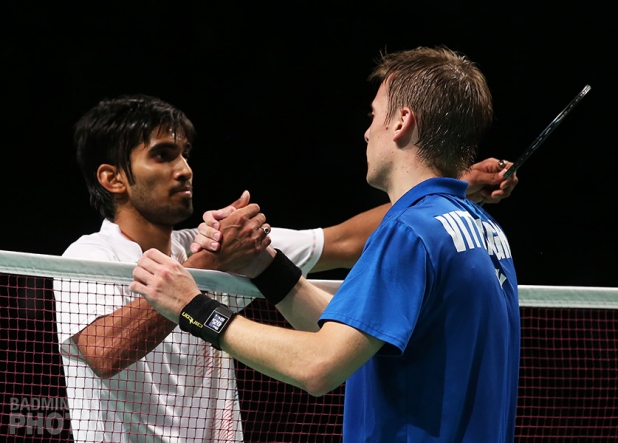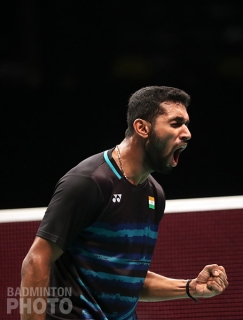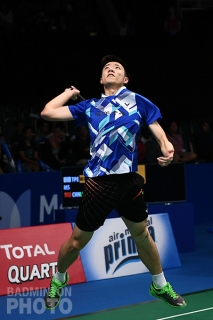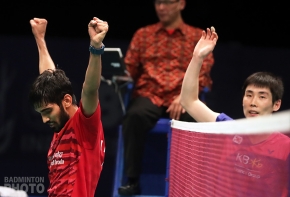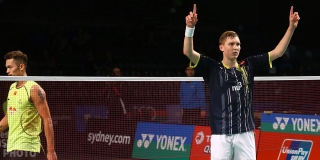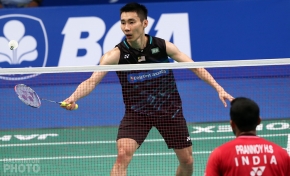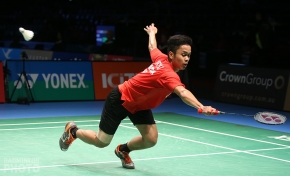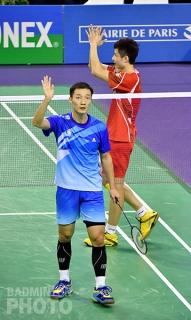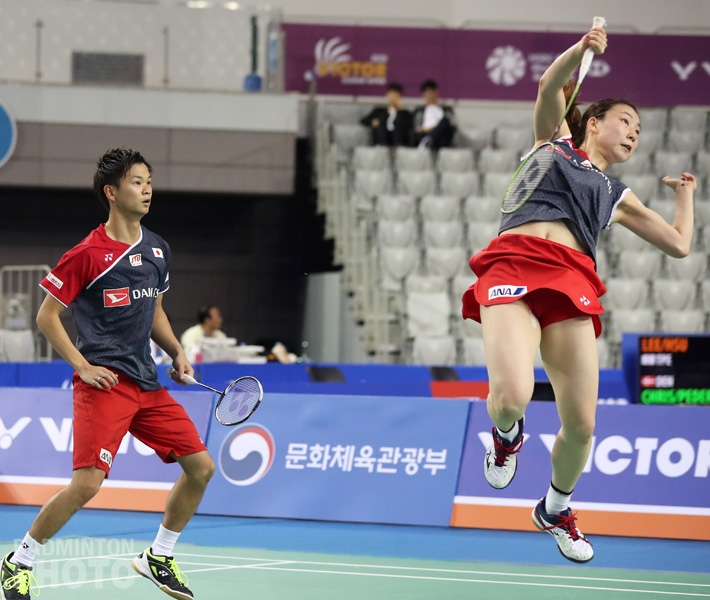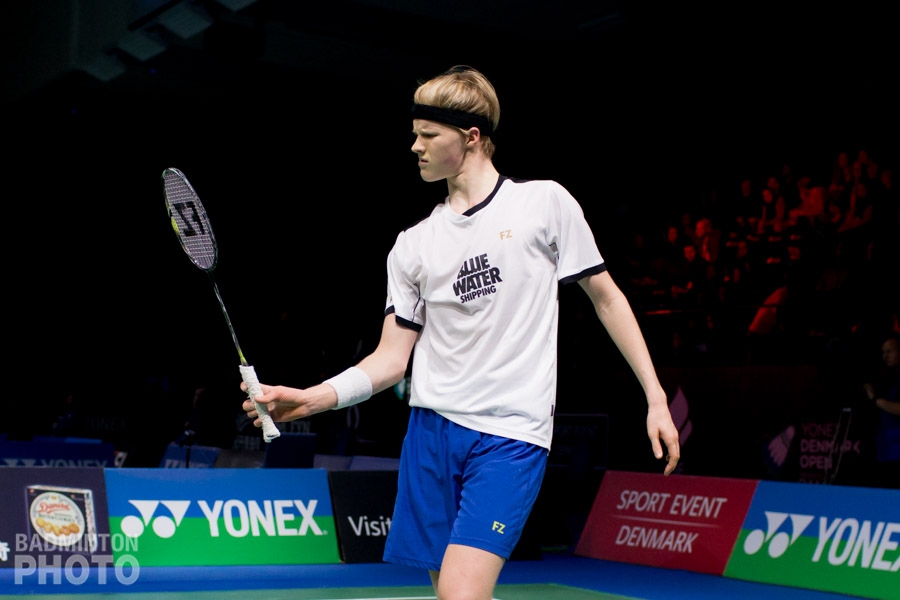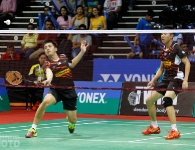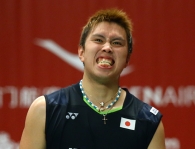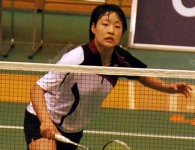Normally the outcome of the Indonesian Superseries Premier affects men’s singles absenteeism badly but seeing as all the seeds except Son Wan Ho were knocked out of contention early, they will be healthy to play in Sydney.
By Aaron Wong. Photos: Badmintonphoto
Is 16/16 equivalent to 17/17?
This is a bumper preview because it is shaping up as the most sensational Australian Open. So, how best to slice up the men’s singles cake: by world rankings or by titles?
13 of the 16 main first round matches are finals-quality encounters for let’s say a Grand Prix Gold (GPG) event. Make that 16 out of 16 should Kanta Tsuneyama, Ihsan Mustofa and H. S. Prannoy (pictured right) all survive Qualification Day.
When refined to Superseries quality, four encounters are finalists meeting in a first round, or five, depending again on Parupalli’s luck.
16 is also the number of Superseries titleholders in competition. Relaxing the quality to finalists of this standard the count rises to 21 men. Nine (Chou, Sugiarto, Sai Praneeth, Shi, Ng, Vittinghus, Qiao, Saensomboonsuk, and Lee Hyun Il) of these are wanting to drop their one-hit-wonder status while five (Kashyap, Sameer Verma, Jayaram, Hu, and Tian) wouldn’t turn their nose up at a chance to start with their own hit single.
Or perhaps you’d be happy to learn that 10 of the top 10 men registered and the perfect score extends to 17 of the top 17. In fact, 19 of the top 20 men equals the attraction of the 2015 Aussie edition but the sudden explosion in first-time winners didn’t happen until the defending champion Hans-Kristian Vittinghus (pictured top) kicked off the trend with his maiden Superseries success and then five more men joined the party. Not joining the party this year is 2016 runner-up Jeon Hyeok Jin. Jeon, too, was part of a related trend, as he and Vittinghus were the first two of 7 first-time men’s singles Superseries finalists in the second half of last year.
Luckiest draw for defender
2016 marked the highest concentration of first-time winners in this category in the 11-year history of the Superseries and there’s no reason why this advancement should cease in 2017. For the feat to repeat at the last Australian Superseries, such a candidate would most likely derive from the top half of the draw with Huang Yuxiang, H. S. Prannoy, Sameer Verma and Wang Tzu Wei (pictured left) as worthy nominees. This is also because, excellent as new world #1 Son Wan Ho is, he is not the most offensive of customers so aspirants to the title will avail themselves of the possibility of sneaking past as he does not always raise the temperature of a match to full boil.
With stiff competition in all directions, unseeded Vittinghus in fact has the best draw of the lot. His title defence begins with the weakest of the qualifiers, perhaps a former World Junior Champion or maybe a former World Junior silver medallist or GPG runner-up.
India on the edge
All the seeds bar Son Wan Ho (pictured with Srikanth Kidambi) being knocked out of contention early at the Indonesia Open means the full cast should arrive intact but does it indicate fallibility of the best players? (Son has routinely had one of the highest tournament participation rates in the top 10 so we can anticipate his presence regardless of his late, long semi-final on Saturday.)
Often two phenomena coincide to make a brand new champion. With the first in mind, the second to factor in is the sturdy quality throughout the Indian battalion that’s noticeably filling out as well as replenishing to a higher standard since at least 2013. India’s men are on the cusp of the same kind of breakthrough which Japan and Thailand brought to the women’s game, the kind to be spoken about in the present tense rather than referred to as isolated examples. Eight of the nine Indians in the luckier top half of the draw is a statistical significance which cannot be ignored.
Murder on the downstairs floor
The carnage of famous faces awaits in the other half of the draw with Lee Chong Wei literally falling to the bottom as the second seed since relinquishing his grip atop the world rankings to Korea’s Son. Reigning Olympic champion Chen Long and two-time Olympic champion Lin Dan are among the unseeded. Quarter-finals and semi-finals ticketholders surely won’t complain.
Third seed and mature for his age, Viktor Axelsen (pictured), will be eager to prevent a complete reversal of fortune upon meeting Lin Dan for another first round bout in Australia. Back in 2015, Axelsen was incensed about missing out on a seeding when his world ranking slipped from eighth to ninth by the closing date for Sydney’s entries. But this match turned out to be the pivotal moment Axelsen’s progress and career shifted into hyperdrive.
Viktor’s unexpected midnight opening round victory over second-seeded defending champion Lin Dan was simultaneously a trial by fire and blessing in disguise. Ever since that day, the Dane became confident of beating anybody. Axelsen reached that Australian final and lost to Chen Long in three games but by the year’s end the he’d dealt a first defeat to the tall Chinese and it was straight through. Around that period, Lin received the same treatment but under10 in both games, not to mention being denied a Rio bronze medal.
In his favour, Lin Dan has overcome Axelsen this year at the All England and what we’ve heard from players over the years about the Australian court conditions is that it is a ‘slower’ hall with little wind. The worse you can say about Lin is some vague rhetoric that he isn’t the player he used to be but being one of four men with a Superseries title under the best this year and one of only three with titles in both 2016 and 2017, he is genuinely relevant on the badminton scene, just not incomparable like before. Lin happens to have to play another of those ‘only three’ men in his opening round.
Promotional nightmare
However, local spectators are only living for a never-before-seen-in-Sydney Lin Dan-Lee Chong Wei spectacle in the quarter-finals. The tantalising opportunity is there and could so easily go begging for a second year running. The latter flew Down Under last time only to withdraw right away and it is hard to believe both greats have continued post-Olympics, still at the top no less. Talk of stiff competition is all fine and dandy until you realise that anything less than a combined Lin-Lee billing – or the next best thing, an Olympic gold medal rematch between Chen Long and Lee Chong Wei (pictured) – eventuating is a commercial nightmare.
Twenty-year-old Anthony Ginting (pictured below), the most exciting to watch player on the men’s singles circuit, hasn’t done it yet in three attempts but nobody would doubt his capability of ousting Jan O Jorgensen in the first round. Ginting schooled Chen Long in straight games at last year’s Australian so the promoter’s fears are not unfounded.
Oddly good odds
If you’re going for the long shot of a fresh faced champ from outside the top 20 with experience in neither a Superseries nor a Grand Prix Gold final, then Ginting is your man. Within the top 20 and without such credentials is the European Championship silver medallist Anders Antonsen. Too bad they are in the bottom draw so it probably won’t happen at the Australian.
Similarly, due to being bottom dwellers, you’ll need to be optimistic if your opinion is that this year’s winner will be a second-time Superseries champion. Oddly enough the good money is on the oldest player in the field, 37-year-old Lee Hyun Il, who consistently posts late stage finishes and top 10 upsets. Or, there’s the man who beat Lee for his own first at the French Superseries, China’s highest ranked male Shi Yuqi (pictured below).
Picking inside the top 20 from a Grand Prix star looking to upgrade is a risk worth taking with Taiwan’s Wang Tzu Wei mentioned at the outset. Past the fence at world #21 is China’s Huang Yuxiang.
The downside of whoever emerges from the top half of the men’s singles draw is that the final could be facing the highest skilled opponent albeit a fatigued one. The best able to convert in this scenario is probably the new world #1 Son Wan Ho, who can be considered an ‘underdog’ precisely because few really believe his ranking reflects reality.
Men’s singles makes each of the six days in Sydney worth attending. Even on Qualification Day, every quarter contains a Grand Prix finalist itching to burst out. The field cannot possibly be tougher. Spectators would be greedy to ask for more cake.
First round men’s singles matches of note:
Chou Tien Chen (TPE) [6] vs. Huang Yuxiang (CHN)
Wang Tzu Wei (TPE) vs. Sameer Verma (IND)
Jan O Jorgensen (DEN) [5] vs. Anthony Ginting (INA)
Viktor Axelsen (DEN)[3] vs. Lin Dan (CHN)
Anders Antonsen (DEN) vs. Lee Hyun Il (KOR)
(possible) Lee Chong Wei (MAS) [2] vs. Ihsan Maulana Mustofa (INA)
For Part II of the Preview, click here
![AUSTRALIAN OPEN 2017 Preview Part 1 – Delectable any way you slice it Normally the outcome of the Indonesian Superseries Premier affects men’s singles absenteeism badly but seeing as all the seeds except Son Wan Ho were knocked out of contention early, they […]](http://www.badzine.net/wp-content/uploads/ngg_featured/20160611_1541_AustraliaOpen2016_BP__2286_rotator.jpg)
